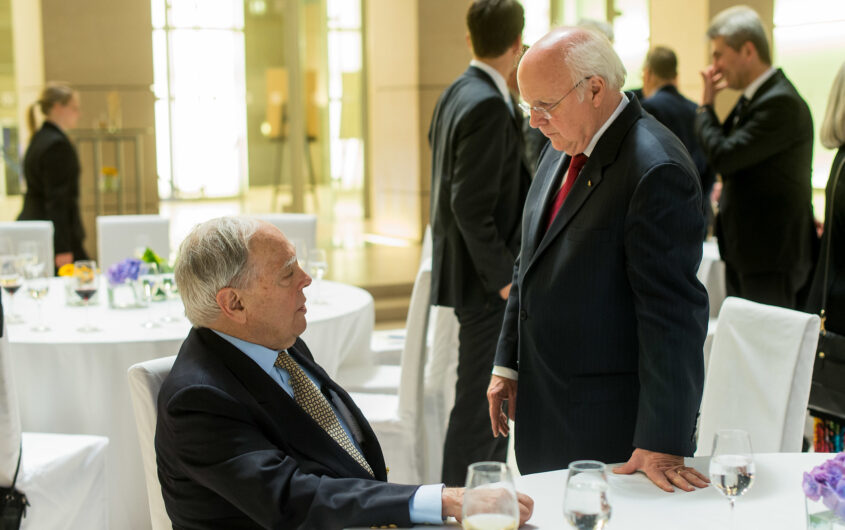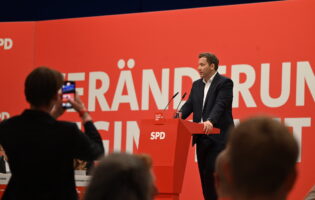AGI News
Seizing the Day

Jackson Janes and R.G. Livingston at the 30th anniversary celebration of AICGS in Berlin in 2013.

Jackson Janes
President Emeritus of AGI
Jackson Janes is the President Emeritus of the American-German Institute at the Johns Hopkins University in Washington, DC, where he has been affiliated since 1989.
Dr. Janes has been engaged in German-American affairs in numerous capacities over many years. He has studied and taught in German universities in Freiburg, Giessen and Tübingen. He was the Director of the German-American Institute in Tübingen (1977-1980) and then directed the European office of The German Marshall Fund of the United States in Bonn (1980-1985). Before joining AICGS, he served as Director of Program Development at the University Center for International Studies at the University of Pittsburgh (1986-1988). He was also Chair of the German Speaking Areas in Europe Program at the Foreign Service Institute in Washington, DC, from 1999-2000 and is Honorary President of the International Association for the Study of German Politics .
Dr. Janes is a member of the Council on Foreign Relations, the International Institute for Strategic Studies, the Atlantic Council of the United States, and American Purpose. He serves on the advisory boards of the Berlin office of the American Jewish Committee, and the Beirat der Zeitschrift für Außen- und Sicherheitspolitik (ZfAS). He serves on the Selection Committee for the Bundeskanzler Fellowships for the Alexander von Humboldt Foundation.
Dr. Janes has lectured throughout Europe and the United States and has published extensively on issues dealing with Germany, German-American relations, and transatlantic affairs. In addition to regular commentary given to European and American news radio, he has appeared on CBS, CNN, C-SPAN, PBS, CBC, and is a frequent commentator on German television. Dr. Janes is listed in Who’s Who in America and Who’s Who in Education.
In 2005, Dr. Janes was awarded the Officer’s Cross of the Order of Merit of the Federal Republic of Germany, Germany’s highest civilian award.
Education:
Ph.D., International Relations, Claremont Graduate School, Claremont, California
M.A., Divinity School, University of Chicago
B.A., Sociology, Colgate University
Expertise:
Transatlantic relations, German-American relations, domestic German politics, German-EU relations, transatlantic affairs.
__
Remembering Gerry Livingston
The German expression “Man sieht sich immer zweimal im Leben” (you always meet twice in life) has special meaning for my long friendship with Gerry Livingston. I owe my career to him. Twice.
Gerry and I met in August of 1979 in Washington, DC. At the time, he was President of the German Marshall Fund of the United States, and he was in the market for someone who could be recruited to be the representative of the Fund in Europe, more specifically in Germany. I did not know a lot about GMF nor about Gerry. But I had been advised that I should meet him and talk about that job opportunity if I was interested.
We met at the headquarters of GMF on Dupont Circle in Washington. As I walked into the office, Gerry came out to meet me with a glass of champagne as the staff were celebrating a birthday. But we got down to business quickly, and a half hour later, I departed with a sense that the opportunity was attractive even though I wasn’t sure I would hear from him again.
Three months later, Gerry called me and offered me the job to take up work for the GMF in Bonn starting in July of 1980. I knew I wanted to accept, even though I was still not sure what I was expected to do. But as I learned from Gerry, you take advantage of opportunities when they are in front of you. Carpe Diem was a slogan that came to mind; Gerry Livingston was the embodiment of that spirit, seizing opportunities and making them succeed.
Gerry and I were to work together for just one year, but it was a crash course in navigating the political environment in Bonn. It was increasingly clear to me how Gerry commanded an enormous network. Years later I learned that his entire previous career was immersed in German and European affairs, just as mine would be.
Gerry departed his job at GMF at the end of 1980. While I continued my work in Bonn over the next four years, I had occasional contact with him. He visited me in Bonn in 1984 and described how he had established an institute in Washington called the American Institute for Contemporary German Studies (AICGS, now the American-German Institute), which was affiliated with Johns Hopkins University.
He created the Institute in 1983 in partnership with the President of the University, Steven Muller. He wanted the focus to be on postwar Germany and both East and West Germany. They wanted AICGS to be a center for advanced research and analysis on the divided nation of Germany, hence, the importance of an affiliation with Johns Hopkins University.
I knew Gerry as a leader, mentor, and friend. For those of us committed to building bridges over boundaries, he left not only a model but also a motto: carpe diem.
The very fact that the focus was on both German states was a unique approach at the time, with the study of West Germany and East Germany usually divided along the lines of the Cold War. Gerry saw an opportunity to ask questions about the future of a country that was caught in that confrontation, questions that needed to be asked. How permanent was Germany’s division? What were the two states talking to each other about? What did Americans need to know about those relations? There was a very unique platform for that specific kind of focus in the United States. Gerry was following his carpe diem idea. And he had a strong and generous supporter in the person of President Steven Muller, who believed thoroughly in the Institute’s mission.
Over the next few years, Gerry was busy expanding the work of AICGS in Washington. With fellowships, conferences, and publications, AICGS was gaining attention. The Institute had also served as a platform for speakers not only from the Federal Republic but also from the GDR as relations between both states remained central to the environment emerging between the United States and the Soviet Union. Gerry was able to provide a bridge over a sensitive boundary on both sides of the Atlantic at a pivotal point.
While all this was happening, Gerry needed help. And so the metaphorical reference to meeting twice came about for Gerry and me when he was to again change my life.
In the summer of 1988, Gerry came to visit me when I was working at the University of Pittsburgh and asked if I might happen to know anyone who would like to join the Institute to help him build it. It did not take long for us to agree to talk about that further, and later that year, we agreed that I would come on board to help him raise the resources needed to strengthen AICGS. That chapter started in January 1989—ten months before November 9 and the fall of the Berlin Wall.
I worked with Gerry for the next seven years before he retired. In that time, Germany achieved unification and faced enormous challenges and strategic questions about its future. Gerry was in Germany just prior to the November 9 events and would call me to relay what he saw coming in those turbulent weeks. A year later, we were working on the actual fact and impact of German unity. The Institute’s mission was continuing to stretch to meet the demands for answers. Forty years after he founded it, the Institute remains a vibrant and unique resource and a tribute to the foresight, resilience, and determination Gerry Livingston embodied.
My experiences with Gerry both at the German Marshall Fund and later at the Institute were to become a central part of my professional career. I watched Gerry utilize his vast knowledge of Germany to enrich the German-American dialogue—often by asking hard, often uncomfortable, questions directed at both sides of that equation.
I also witnessed his tireless efforts in persuading Americans and Germans of the importance of grasping what we share but also what we clearly need to argue about in a common community of interests and values, neither to be taken for granted. And he didn’t settle for anything short of candid, honest dialogue. That was true no matter with whom he was dealing, be it high-level politicians in Berlin or Washington or with leading scholars, diplomats, and intellectuals.
And perhaps most importantly, he enjoyed every minute of that effort. Gerry could find common ground with most people and relished exploring both similar and differing ideas. He never stopped reaching out to those who were willing to engage with him. He was energized by making connections between people and never intimidated by controversy.
I knew Gerry as a leader, mentor, and friend. For those of us committed to building bridges over boundaries, he left not only a model but also a motto: carpe diem. I tried my best to follow in Gerry’s footsteps for many years after he left the Institute.
Three weeks before Gerry passed away, I was able to sit with him and talk about the many accomplishments he should be proud of. He listened carefully, could not recall everything I mentioned, but said: “I am glad to hear all that.” I was very grateful that he did.









